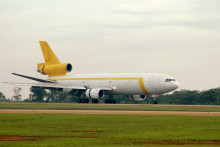Unmanned cargo planes remind me of drones for mail delivery, but then on a larger scale. Is that a good comparison?
'Drones are as it were the postman on his bicycle, and these unmanned cargo aircraft replace the trucks which transport a much larger load over longer distances. We (the academics and companies working together in UCA, ed.) are now thinking of aircraft that can carry between 2 and 20 tonnes of cargo, on both continental and intercontinental flights.'
When will the first unmanned freighter fly?
'In Afghanistan, an unmanned helicopter is already transporting small consignments for the U.S. Marines. But that is something quite different. Perpendicular taking off and landing is very inefficient, something that you only do when it is unavoidable.
There are already a few designs and ideas for unmanned cargo planes, but I think it will still take ten years until the first flight. We do not yet know exactly what requirements unmanned aircraft must meet. Moreover, the airspace is not yet open for aircraft without crew.'
 Why would you want to transport freight without a crew?
Why would you want to transport freight without a crew?
'Flying becomes much cheaper. First of all, you can save on the salaries of pilots. On a long flight, you easily require a crew of between 6 and 12 people. But that is not the most important reason. Without staff you don't need rest breaks. You can therefore have the aircraft fly at a lower speed. Fuel consumption is much lower and yet the flight is faster than other forms of transport.
Furthermore, without crew on board you do not need a pressurized cabin. This makes an aircraft 10 to 20 percent lighter. The flights are also more efficient. You do not have to fly back and forth because the pilot has to go home. Compare it with car rental. You can also drop off your car at a different location than where you picked it up.'
For which countries is there particularly a gap in the market for this?
'The UCA Platform wants us to be able to transport cargo all over the world, also in small volumes. With unmanned flights, parts of the world with a poor infrastructure will also be able to compete in the global economy.
For example, we had a lecture by a researcher who sees opportunities in Africa. This man, Jonathan Ledgard, wants to deploy unmanned aircraft as a flying mule. Cargo planes without crew are particularly interesting in countries where other forms of transport are not well developed.'



 Why would you want to transport freight without a crew?
Why would you want to transport freight without a crew?



